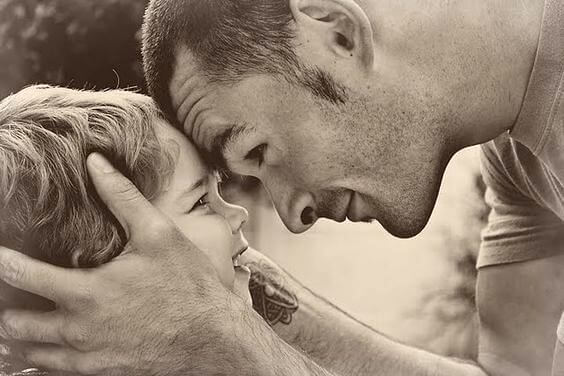Mom and Dad: I Want to Learn to Be Independent

For many people, being independent is a very difficult challenge that requires a lot of effort and tenacity. Being psychologically independent is having an attitude towards life filled with bravery, love, and trust in one’s potential.
However, despite all the benefits of having this attitude towards life, it isn’t so easy for some people, mainly because they haven’t been taught to be independent. Some people don’t learn to have this attitude as children, and later, life inevitably pushes them towards it.
“The ideal is not that children accumulate knowledge, but that they develop abilities.”
-John Dewey-
Learning to be independent doesn’t mean being reckless
When we encourage children to do things for themselves, we’re sending them a clear message. We’re telling them that they’re capable of getting along in the world and that we believe they can do it. That way, they’ll stop looking to others and start exploring the resources available to them. “If other people think that is the key, then I’ll have to look for it.”
However, we should clarify a few things. When we say “independence,” we’re not encouraging recklessness. We’re talking about reasonable challenges that are necessary for healthy personal development. A child can learn to be psychologically independent to the extent that their parents trust that they can resolve certain problems on their own.

“The child’s development follows a path of successive stages of independence, and our knowledge of this must guide us in our behaviour towards him. We have to help the child to act, will and think for himself.”
-Maria Montessori-
If we don’t let them make mistakes, they can’t learn
Here’s an example to help you understand this a little better: a child is learning how to do division. They were taught in school, and now it’s time to do homework to practice division. At this point, one of their parents appears and notices the child struggling.
Seeing their child facing this challenge can tempt the parent to do it for them. In fact, some incredibly skilled children get adults to do homework for them since they know how to win them over. But giving into this temptation isn’t what’s best for them. Parents can help calm their child’s anxiety over the challenge or even start the task to focus their child’s attention, but they can’t do their homework for them.
We have to give children space for them to act. If we intervene too quickly and don’t let them try division for themselves, we’re sending them the message that we don’t trust in their abilities. We’re telling them that the challenge is too difficult for them, so they should give up before they even try.
For children, our trust is a huge gift
In the above example, the parent could take a different route. They could sit by their child’s side and let them do the division by themselves. The child will try their best, and they will make mistakes. Parents can help them through the process of trial and error and point things out to them without giving them the answers.

We have to allow them to make mistakes, because that way they’ll learn how to do division correctly. And we’ll also be giving them space to familiarize themselves with the process, have doubts, and resolve them by themselves. That way, they’ll mark the path for themselves and they won’t get stuck anymore.
They’ll understand where they went wrong and fix their mistakes. Learning this will make them feel competent and capable. This new view of themselves will allow them to face their little problems with more confidence and security in their own abilities.
“My father gave me the greatest gift anyone could give another person, he believed in me.”
-Jim Valvano-
By helping them in this way, you’re not leaving them to face adversity alone, you’re helping them to develop their intellectual abilities. You’re helping them to feel it out, to generate possible solutions, to prove themselves, to try. This will all create new connections in their brain. That’s why the role of the family is so vital in achieving this goal.
Being overprotective blocks their opportunities for growth
Being overprotective involves a type of immediate assistance in which the adult intervenes rapidly in every little difficulty their child faces. The child will learn that there will always be someone to solve all their problems for them. They’ll stop trying to do things for themselves, because there will always be someone to do it for them. All they have to do is sit, smile, and wait.
“Even the biggest love needs air to develop.”
-Daniel Glattauer-
This rapid assistance is intended to send a message of care and love for the child: “I do everything for you because I love you.” But underneath it all is the message that “I do everything for you because I don’t think that you can do it,” and this will inevitably give them the idea that they’re not capable of doing things for themselves.
The consequences of overprotecting your children
With that, they’ll stop trying, experimenting, and making an effort, and they’ll lose out on opportunities for growth. They’ll entrust their lives more and more to their parents. But this doesn’t come without a cost, and it will result in a series of consequences:
- They’ll ask their parents for help on their homework very often.
- They’ll get discouraged at the first hint of difficulty.
- They won’t tolerate frustration well.
- They’ll become insecure and dependent on others.
- They’ll have a low self-esteem and self-concept.
That’s why it’s important to help children to make discoveries for themselves, to make mistakes, to test things out, to tolerate frustration. This way, they’ll learn that they have the resources and abilities to solve most, if not all, of the problems that they encounter in their lives.

We’ll conclude this reflection with a Chinese proverb that you’ve probably heard many times: “Give a man a fish and you feed him for a day, teach a man to fish and you feed him for a lifetime.” So now we encourage all parents to teach their children to fish instead of giving them a fish at the first sign of difficulty, to let them try things for themselves. This will be a very useful and necessary lesson that they’ll carry with them into the future.
This text is provided for informational purposes only and does not replace consultation with a professional. If in doubt, consult your specialist.








